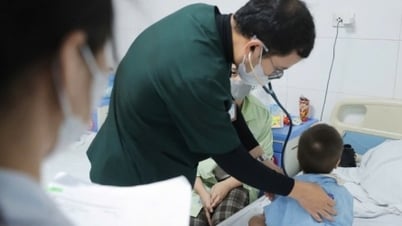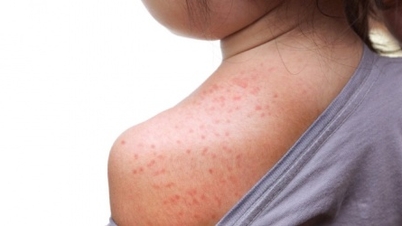Medical news September 24: Hanoi launches measles vaccination campaign
Hanoi City People's Committee issued Plan No. 278/KH-UBND on implementing the measles vaccination campaign in the area in 2024.
Hanoi launches measles vaccination campaign for children aged 1-5
Accordingly, the subjects receiving vaccination in this plan are children from 1 to 5 years old living in Hanoi and medical staff at risk at medical examination and treatment facilities treating measles patients in the city who have not received enough doses of vaccine as prescribed.
The plan excludes subjects who have been vaccinated with measles-containing vaccines or measles-rubella (MR) vaccines or vaccines containing measles and rubella within 1 month before vaccination and subjects who have received enough doses of measles-containing vaccines as prescribed.
 |
| Hanoi will launch a measles vaccination campaign in the area in 2024. |
The vaccination campaign will be implemented in the third and fourth quarters of 2024, after the Ministry of Health provides vaccines to all 579 communes, wards, and towns of 30 districts, towns, and cities across the city.
Vaccination locations are at health stations, kindergartens, preschools and other mobile vaccination sites depending on the actual situation in the locality.
The goal is that over 95% of children aged 1-5 living in Hanoi who have not received enough doses of measles-containing vaccines as prescribed will receive one dose of measles-rubella (MR) vaccine.
The City People's Committee requested the Hanoi Department of Health to coordinate with the Department of Education and Training in organizing screening of subjects and vaccination at preschools and kindergartens.
The People's Committees of districts, towns and cities develop plans to implement measles vaccination campaigns in their areas. At the same time, the People's Committees of districts, towns and cities direct communes, wards and towns to conduct investigations and review of subjects and vaccination history; direct schools to coordinate with the health sector to effectively carry out investigations and arrange human resources to participate in vaccination.
Last week (from September 13 to 20), according to the report of Hanoi CDC, the city recorded 2 more measles cases; including a girl (15 months old in Dong Da district) with a history of not being vaccinated against measles and a boy (7 years old in Hoang Mai district) who was not fully vaccinated against measles.
Thus, since the beginning of the year, Hanoi has had 6 cases of measles. Currently, measles tends to increase in some provinces and cities such as Ho Chi Minh City, Nghe An, Thanh Hoa.
In Hanoi, there have been sporadic cases of measles recorded in the area. Therefore, it is forecasted that there may continue to be more cases of measles recorded in the coming time, especially in the last 3 months of the year.
Don't be subjective with streptococcus
According to the Hanoi Center for Disease Control (CDC), the city has just recorded a case of streptococcus suis in Dan Phuong district. The patient is a male (77 years old), with an unknown epidemiological history, who started the disease on September 6 with symptoms of high fever, body aches, poor appetite, hearing loss, and then became lethargic.
The patient was admitted to the Central Hospital for Tropical Diseases for treatment, and a blood culture test showed positive results for Streptococcus suis. Currently, the patient's health is stable. Thus, from the beginning of 2024 until now, Hanoi has recorded 9 cases of Streptococcus suis, 1 death.
Streptococcus suis (S. suis) is a zoonotic disease that can be fatal. Patients often have severe clinical symptoms, require long-term treatment, are expensive to treat, and often leave irreversible complications after recovery.
According to Dr. Pham Van Phuc, Deputy Head of the Intensive Care Unit, Central Hospital for Tropical Diseases, Streptococcus suis is a gram-positive bacterium that usually resides in the upper respiratory tract such as the nose, digestive tract and genitals of pigs. This bacterium can cause disease in pigs and humans.
Streptococcus suis is transmitted through lesions and scratches on the skin of those who slaughter, process and eat undercooked infected pork. People infected with streptococcus suis may suffer from infection, digestive poisoning, fever, hemorrhage, meningitis. When severe, the disease causes septic shock, blood clotting disorders, respiratory failure, multiple organ failure leading to death.
Notably, streptococcus suis develops very quickly. Symptoms include abdominal pain, nausea, vomiting, or rashes on the body just a few hours after the disease begins. Treatment of streptococcus suis is also very difficult, and patients often have to stay in the intensive care unit for several weeks.
Even if hospitalized when the condition is severe, the patient is at risk of skin, hand, and face necrosis and severe physical sequelae such as deafness and amputated fingers.
Hanoi CDC notes that people who eat products made from undercooked pork, such as blood pudding, fermented pork rolls, and fermented pork rolls, are susceptible to streptococcus suis.
Not only eating raw blood pudding or meat, but also coming into contact with sick or dead pigs can cause the slaughterer to be infected with streptococcus suis through skin lesions and scratches. There is currently no vaccine for streptococcus suis, so it is very important to eat well-cooked food and drink boiled water.
Therefore, health experts recommend that, to prevent disease, people should not slaughter sick or dead pigs; should wear gloves and protective equipment when in contact with raw or undercooked pork, and wash their hands thoroughly after processing meat.
In addition, each person also needs to give up unhealthy eating habits such as blood pudding (including pig blood pudding and blood puddings of goats, geese, and ducks). When having symptoms of the disease, people need to go to medical facilities immediately for examination and timely treatment.
Warning of thyroid cancer rejuvenation
NHH, a 9-year-old child, had a lump in his neck that lasted for 3 months and did not go away. Unsure, his family took him to the hospital and discovered thyroid cancer with lymph node metastasis. This is the first time Tam Anh General Hospital, Ho Chi Minh City, has admitted and treated a 9-year-old child with thyroid cancer.
Ms. THM (34 years old, mother of baby H.) said that no one in her family has cancer. 2 months ago, while bathing her baby, she saw the front of her baby's neck swollen the size of a peanut. She took her baby to many hospitals but after an ultrasound, they only advised further monitoring.
Thyroid cancer is a condition in which thyroid parenchyma cells develop abnormally, forming a malignant tumor. Thyroid cancer in children is rare, and is also found in the 15-19 age group.
The cause of thyroid cancer in children is unknown, however risk factors for this disease include: radiation exposure, goiter and autoimmune thyroiditis, genetics, families with many people with thyroid cancer...
Thyroid cancer in children develops faster than in adults. If not detected and treated promptly, thyroid cancer will metastasize to lymph nodes, lungs, bones, brain, etc., making treatment difficult and directly affecting the patient's life and survival time.
However, if detected early and treated promptly, most children with thyroid cancer respond well and have a high chance of being cured. As in the case of baby H, when it was detected when it had just metastasized to the lymph nodes in the neck and treated immediately, the prognosis for cure is 99%.
Each patient will be prescribed a different dose of radioactive iodine by the doctor, even if the dose is high, it will not affect fertility. Each patient will have a different level of radioactive iodine, which will not affect future fertility. 6-12 months after taking radiation, the patient can get pregnant, ensuring the safety of the fetus and the health of the mother.
Through this case, doctors recommend that parents and adults in the family should observe their children. When they see symptoms such as neck tumors, swollen lymph nodes, hoarseness, difficulty breathing, etc., they should see a specialist for examination, diagnosis and appropriate treatment.
In the case of medullary thyroid cancer, in addition to the above symptoms, children may have enlargement of the lips, tongue, eyelids, dry eyes, constipation, etc. At the same time, parents should take their children for regular health check-ups to detect abnormalities early (if any) and treat them promptly.



![[Photo] General Secretary concludes visit to Azerbaijan, departs for visit to Russian Federation](https://vphoto.vietnam.vn/thumb/1200x675/vietnam/resource/IMAGE/2025/5/8/7a135ad280314b66917ad278ce0e26fa)


![[Photo] General Secretary To Lam receives leaders of typical Azerbaijani businesses](https://vphoto.vietnam.vn/thumb/1200x675/vietnam/resource/IMAGE/2025/5/8/998af6f177a044b4be0bfbc4858c7fd9)


























































![[Photo] Prime Minister Pham Minh Chinh talks on the phone with Singaporean Prime Minister Lawrence Wong](https://vphoto.vietnam.vn/thumb/402x226/vietnam/resource/IMAGE/2025/5/8/e2eab082d9bc4fc4a360b28fa0ab94de)


































Comment (0)